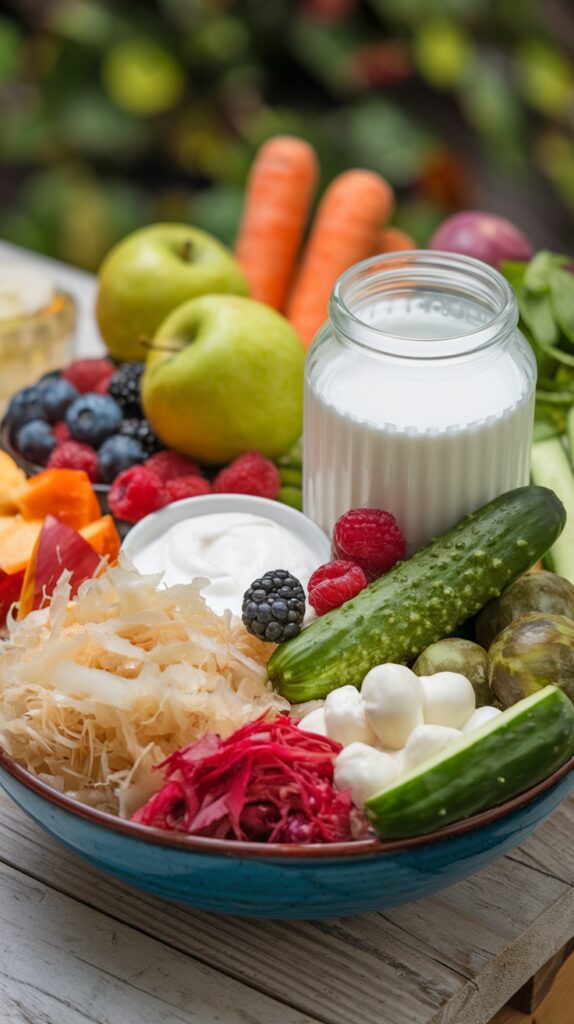
Maintaining a healthy gut isn’t just about digestion—it impacts your overall health, energy, and even your mood. A balanced gut microbiome is key to avoiding bloating, improving nutrient absorption, and promoting long-term health. Here’s a list of the best foods for a gut-friendly diet, plus simple recipe ideas to get you on track.
1. Understanding Gut Health
Gut health refers to how well your digestive system functions and its balance of bacteria. Your gut microbiome—home to trillions of microorganisms—plays a role in digestion, immune support, and even brain function. To keep this system running smoothly, focus on a diet rich in fiber, probiotics, and prebiotics.
2. High-Fiber Foods
Fiber is essential for digestion. It feeds the good bacteria in your gut and keeps everything moving. There are two types: soluble fiber (dissolves in water) and insoluble fiber (adds bulk to your stools), both of which are crucial for gut health.
Best High-Fiber Foods:
- Whole Grains: Oats, quinoa, and brown rice.
- Fruits: Apples, pears, and berries.
- Vegetables: Broccoli, carrots, and Brussels sprouts.
- Legumes: Lentils, chickpeas, and black beans.
Recipe Idea: Quinoa Salad with Veggies
Cook 1 cup of quinoa. Toss with chopped cucumbers, cherry tomatoes, and parsley. Drizzle with olive oil and lemon juice. Add a pinch of salt for flavor.

Photo by Mikhail Nilov
3. Probiotic Foods
Probiotics are live bacteria that support gut health. They help balance your gut microbiome, especially after taking antibiotics or dealing with digestive issues like constipation.
Top Probiotic-Rich Foods:
- Yogurt: Choose plain, unsweetened varieties with live cultures.
- Kefir: A tangy, drinkable fermented milk.
- Sauerkraut: Fermented cabbage rich in probiotics.
- Kimchi: Spicy, fermented Korean vegetables.
Recipe Idea: Yogurt Parfait
Layer plain yogurt with granola and fresh berries for a gut-healthy breakfast or snack.
4. Prebiotic Foods
Prebiotics are the “food” for probiotics. They help those good bacteria thrive, improving your gut health over time.
Best Prebiotic Foods:
- Garlic and onions: Add flavor and promote gut bacteria growth.
- Bananas: Especially ripe ones.
- Asparagus: Packed with fiber and prebiotics.
Recipe Idea: Roasted Garlic Asparagus
Drizzle asparagus spears with olive oil, sprinkle with minced garlic, and roast at 400°F for 15 minutes.
5. Fermented Foods
Fermented foods are loaded with probiotics. They also improve digestion by breaking down food during fermentation, making nutrients easier to absorb.
Make These Fermented Foods at Home:
- Homemade Yogurt: Use a yogurt starter and milk for a fresh, preservative-free option.
- Kombucha: Brew this fizzy fermented tea at home with a SCOBY starter kit.
- Pickles: Ferment cucumbers in a saltwater brine for a crunchy snack.
6. Whole Grains
Whole grains are packed with fiber and are less processed than refined grains, which lose their nutrients. They support your digestion by promoting regular bowel movements.
Gut-Friendly Recipes:
- Overnight Oats: Mix ½ cup rolled oats, 1 cup almond milk, and a handful of berries in a jar. Refrigerate overnight.
- Brown Rice Bowl: Pair steamed rice with roasted veggies and a drizzle of tahini sauce.
7. Fruits for Gut Health
Fruits are rich in fiber, antioxidants, and natural sugars. They’re a great way to sweeten your diet while improving gut health.
Recommended Fruits:
- Apples: High in pectin, a type of soluble fiber.
- Berries: Blueberries, raspberries, and strawberries are fiber-packed.
- Bananas: Great for soothing an upset stomach.
Recipe Idea: Gut-Friendly Smoothie
Blend 1 banana, a handful of spinach, ½ cup yogurt, and 1 cup water for a refreshing drink.
8. Vegetables for Optimal Digestion
Leafy greens and cruciferous veggies are fantastic for your gut. They’re loaded with fiber, vitamins, and minerals.
Top Veggies to Eat:
- Leafy Greens: Spinach, kale, and Swiss chard.
- Cruciferous Vegetables: Broccoli, cauliflower, and Brussels sprouts.
Recipe Idea: Garlic Roasted Broccoli
Toss broccoli florets with olive oil and minced garlic. Roast at 375°F for 20 minutes.
9. Healthy Fats
Healthy fats, such as omega-3s, support gut health by reducing inflammation and promoting a balanced microbiome.
Best Sources of Healthy Fats:
- Avocado: Spread on toast or blend into smoothies.
- Olive Oil: Use for salad dressings or light sautéing.
- Nuts and Seeds: Almonds, chia seeds, and walnuts.
Recipe Idea: Avocado Toast with Seed Topping
Mash half an avocado onto whole-grain toast. Sprinkle with chia seeds and a pinch of salt.
10. Legumes and Pulses
Legumes are dense in fiber, plant-based protein, and prebiotics. They’re perfect for both digestion and overall gut health.
Recipe Idea: Lentil Soup
Sauté onions, garlic, and carrots. Add 2 cups lentils, 4 cups vegetable broth, and spices. Simmer for 30 minutes.
11. Herbs and Spices for Gut Health
Certain herbs and spices not only enhance flavor but are also anti-inflammatory and soothing for digestion.
Top Gut-Healthy Options:
- Ginger: Excellent for nausea and bloating.
- Turmeric: Anti-inflammatory benefits.
- Peppermint: Calms an upset stomach.
Recipe Idea: Ginger Tea
Steep freshly sliced ginger in boiling water. Add honey and lemon for extra flavor.
12. Hydration and Its Impact
Drinking enough water is essential for digestion. It helps dissolve nutrients and moves waste through your system more effectively. Aim for 8–10 cups daily, and incorporate herbal teas for an added boost.
13. Foods to Avoid for Gut Health
Some foods can harm your gut and disrupt your microbiome. Limit processed foods, excessive sugar, and high-fat fried options. Swap sugary snacks for fruits and fried chips for roasted veggies.
Conclusion
Eating for gut health doesn’t have to be complicated. By including high-fiber, probiotic, and prebiotic-rich foods in your meals, you can support digestion and boost your overall health. Experiment with these recipes, build mindful eating habits, and remember—your gut will thank you!
